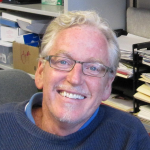July 7, 2015
Charles Campbell receives the AVS Medard W. Welch Award
 The American Vacuum Society has awarded the 2015 Medard W. Welch Award to Professor Charles Campbell. Recipients of the award are recognized for their outstanding theoretical or experimental research in fields related to the AVS within the last ten years. Professor Campbell was selected “for seminal contributions to determining accurate adsorption energetics and for developing key concepts for the analysis of important catalytic reactions.” He will be presented with the award, including a medal, plaque, and an honorary lectureship, at the AVS Awards Symposium on October 21, 2015, part of the 62nd AVS International Symposium and Exhibition.
The American Vacuum Society has awarded the 2015 Medard W. Welch Award to Professor Charles Campbell. Recipients of the award are recognized for their outstanding theoretical or experimental research in fields related to the AVS within the last ten years. Professor Campbell was selected “for seminal contributions to determining accurate adsorption energetics and for developing key concepts for the analysis of important catalytic reactions.” He will be presented with the award, including a medal, plaque, and an honorary lectureship, at the AVS Awards Symposium on October 21, 2015, part of the 62nd AVS International Symposium and Exhibition.
Professor Campbell pursues basic experimental research concerning environmental and energy-related catalysis, interfaces in solar cells and microelectronics, and array-based biochemical analyses. The broad range of work conducted in the Campbell group is aligned along the related goals of developing exquisitely precise tools to measure effects at surfaces more sensitively than anywhere else in the world, and establishing a much deeper understanding of reactivity and physical chemistry at solid surfaces, particularly the kinetics and energetics of elementary steps in energy-related catalytic reactions on solid surfaces.
His previous accolades include the ACS Arthur W. Adamson Award for Distinguished Service to Surface Chemistry, the ACS Award in Colloid and Surface Chemistry, and an Alexander von Humboldt Research Award. Professor Campbell is a Fellow of the American Chemical Society and the American Association for the Advancement of Science, and an Elected Member of the Washington State Academy of Sciences, and he has given numerous endowed lectures, such as the Robert Burwell Lecture in Catalysis, the Gerhard Ertl Lecture, and the Ipatieff Lecture. He is the Editor-in-Chief of Surface Science Reports, previously serving in the same capacity for Surface Science, and he is an active member of several editorial and scientific advisory boards.
For more information about Professor Campbell and his research, please visit his faculty page and his research group website.